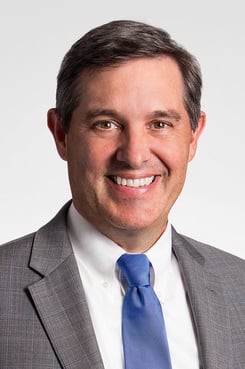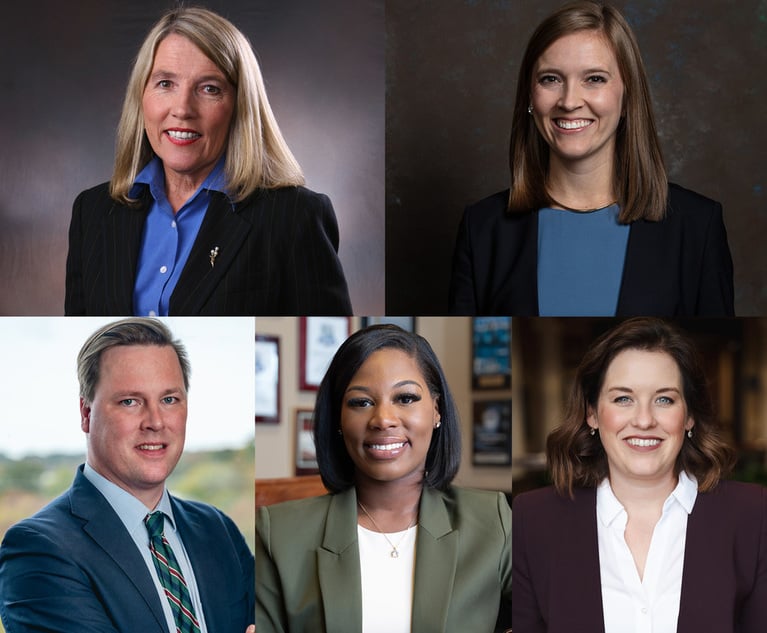Trump's Former Ethics Czar Reflects on White House's Legal Challenges
Stefan Passantino, now with Michael Best, said few people had a grasp of their legal obligations during the opening days of the administration.
December 03, 2018 at 07:46 PM
8 minute read
 Stefan Passantino, Michael Best, Washington, D.C. (Courtesy photo)
Stefan Passantino, Michael Best, Washington, D.C. (Courtesy photo)Stefan Passantino, the former White House deputy counsel in charge of policing ethics in the Trump administration, offered a glimpse Monday into what he said was the immediate and predictable chaos that followed after President Donald Trump finished taking the oath of office in 2017.
Passantino—now a partner at Michael Best with offices in Atlanta and Washington—also defended newly-minted White House staff who had to abandon an operating style that served them well on the campaign trail, but that threatened to violate federal ethics laws once Trump became president.
Passantino, speaking at an Atlanta chapter of the Federalist Society luncheon Monday, said he was tasked by White House Counsel Don McGahn with ensuring Trump's staff adhered to federal laws barring conflicts of interest, which occasionally placed him at odds with incoming campaign staff who had never served in public office and had little understanding of laws like the Hatch Act.
“This administration came in with the understanding that we are here to overturn the apple cart,” he said. “Our job is to not accept norms for the way things are being done. Our job is to take a critical [look] at everything. … And we do not want anything or anyone to stand in the way.”
“That would be exactly, diametrically opposed to my mandate,” Passantino said.
The president's staff, including all Cabinet members and nominees, were required to secure approval from the White House counsel's office before they could start working in the West Wing, he said.
“Sometimes that went well,” he said. “Sometimes it didn't go particularly well. Sometimes folks just couldn't extricate themselves from all the various things financially and otherwise they were invested in.”
And for some, the financial sacrifice was significant. After Rex Tillerson, former chairman and CEO of Exxon, was nominated as secretary of state, Passantino said he told Tillerson he would have to release his claim to $90 million in unvested Exxon pension assets.
Tillerson thought about it for about “two seconds” before saying, “Let's do it,” Passantino recalled. “There are a lot of people who did a lot in order for the privilege to serve.”
Those in attendance included several judges Trump has gotten onto the bench. They included Lisa Branch, who introduced Passantino, and Britt Grant, both judges on the U.S. Court of Appeals for the Eleventh Circuit; Judge William “Billy” Ray of the U.S. District Court for the Northern District of Georgia and Judge Tripp Self of the Middle District of Georgia; U.S. Attorney Byung J. “BJay” Pak of the Northern District of Georgia, U.S. Attorney Bobby Christine of the Southern District of Georgia and federal judicial nominee J.P. Boulee. All are Trump appointees whom Passantino helped shepherd through the confirmation process.
The judges Trump has appointed across the country—most of whom are Federalist Society members—and the administration's focus on deregulation will have an impact that lasts long after Trump's presidency ends, Passantino said.
“That's not the stuff that we want people talking about,” he said. “But some day, folks are going to look back, and they're going to look at what we've done on the regulatory side” and reflect on how the economic climate boosted business confidence and encouraged people to invest in America, he added.
Passantino didn't mention specific regulatory changes but noted, “I look forward to a time in the future when people look back and say the president and the people up there really did have an eye on the ball in the things that they were doing.”
Passantino readily acknowledged that, “Being the Trump ethics guys is not all roses, contrary to what you might have heard,” dubbing himself the “poster child” for the administration's ethics. He said he first met McGahn—who hired him—while Passantino was working at McKenna Long & Aldridge (now Dentons) with Atlanta attorney Randy Evans, Trump's ambassador to Luxembourg. The two attorneys represented former U.S. House Speakers Newt Gingrich and Dennis Hastert during what Passantino called “the ethics wars” of the late 1990s that forced both congressmen to resign.
When Gingrich ran for president, McGahn was chairman of the Federal Election Commission and Passantino said, “We became very close.” When Trump named McGahn as White House counsel, McGahn turned to Passantino as “the person who would take all the bullets and arrows” regarding ethics issues and gave him authority to act as McGahn's surrogate.
Passantino said the learning curve for incoming Trump staff was rapid and steep. As Trump was taking the oath of office, only 15 to 20 people with his new administration were authorized to be in the White House. And the Presidential Records Act requires that every record, every piece of paper, every book, every email associated with the Obama administration be summarily removed and turned over to the federal archives, he said.
While the federal agencies have career people on staff who offer some continuity, there is no continuity in the West Wing.
“We are all political. … There is not a memo on how to structure it or the 15 top things people are going to mess up on the second day,” he said. “We were starting from scratch with a lot of people who didn't really have an understanding of how government works and thought, 'We are here. We're going to bang our fists on the table because that's what works in New York. And we're going to … get stuff done.'”
“The first week or two you get hit over the head with the awesome importance of the things you are doing and your complete lack of preparation,” Passantino said. “And the consequences for getting it wrong are off the charts.”
The process was also “incredibly intimidating,” he said. Passantino cited Trump's first executive order implementing a temporary travel ban on predominantly Muslim countries as a singular example of the “bedlam” that could erupt when campaign staffers Steve Bannon and Stephen Miller began drafting “50 different executive orders on 100 different things we're going to do in the first 24 hours” when only three lawyers were working on site and were not always in the loop.
Passantino said that he was leaving Washington to fly home to Atlanta the Friday after Trump signed the order. He arrived at the airport to find “absolute chaos” as arriving passengers were barred from entering the country and others were being summarily ordered to return to their point of origin.
“It was a very, very immediate awakening [that] we are not in campaign mode anymore,” he said. “When you are president of the United States and you push out executive orders on travel issues … on the Wednesday after Inauguration Day, there are actually going to be real-world consequences immediately from that.”
“And there was nothing … more eye-opening than to get to the airport and realize, we have an awesome responsibility here,” he added. More importantly, he said, Trump's newly-minted policy staff “have an awesome responsibility to talk to the lawyers.”
As a result, he said, “We all sort of understood we all ought to be working together.”
Passantino said that “a lot of people who were part of the previous administration who were either in the White House counsel's office or were very, very well-versed in these Byzantine rules” were quick to target suspected violations by Trump's White House staff. Passantino suggested “there was a very well-funded, very well-organized machine” of lawyers who would “watch every tweet, watch every utterance and file complaints as soon as somebody would drop the ball.”
And Twitter complicated everything, he said. “Twitter was the mechanism by which everyone communicated during the Trump campaign,” Passantino explained. Everyone had a Twitter account.
While the president might be immune from many federal ethics laws, the rest of the staff are required to comply. Their tweets often had White House lawyers scrambling to warn them that they couldn't “just start sending stuff” on official White House accounts or as White House employees, Passantino said.
He said he had to explain to new staffers, “Everything you have—your title, the fact that people are paying attention to you, all of the assets and resources you have—they're there because the taxpayers paid for them to be there. They are not given to you because you're special. The taxpayers gave you that phone. The taxpayers gave you that title. They didn't give you that title because they wanted you to use that to talk about politics or talk about a business.”
This content has been archived. It is available through our partners, LexisNexis® and Bloomberg Law.
To view this content, please continue to their sites.
Not a Lexis Subscriber?
Subscribe Now
Not a Bloomberg Law Subscriber?
Subscribe Now
NOT FOR REPRINT
© 2025 ALM Global, LLC, All Rights Reserved. Request academic re-use from www.copyright.com. All other uses, submit a request to [email protected]. For more information visit Asset & Logo Licensing.
You Might Like
View All


Plaintiffs Attorneys Awarded $113K on $1 Judgment in Noise Ordinance Dispute
4 minute read
'Didn't Notice Patient Wasn't Breathing': $13.7M Verdict Against Anesthesiologists
12 minute readTrending Stories
Who Got The Work
J. Brugh Lower of Gibbons has entered an appearance for industrial equipment supplier Devco Corporation in a pending trademark infringement lawsuit. The suit, accusing the defendant of selling knock-off Graco products, was filed Dec. 18 in New Jersey District Court by Rivkin Radler on behalf of Graco Inc. and Graco Minnesota. The case, assigned to U.S. District Judge Zahid N. Quraishi, is 3:24-cv-11294, Graco Inc. et al v. Devco Corporation.
Who Got The Work
Rebecca Maller-Stein and Kent A. Yalowitz of Arnold & Porter Kaye Scholer have entered their appearances for Hanaco Venture Capital and its executives, Lior Prosor and David Frankel, in a pending securities lawsuit. The action, filed on Dec. 24 in New York Southern District Court by Zell, Aron & Co. on behalf of Goldeneye Advisors, accuses the defendants of negligently and fraudulently managing the plaintiff's $1 million investment. The case, assigned to U.S. District Judge Vernon S. Broderick, is 1:24-cv-09918, Goldeneye Advisors, LLC v. Hanaco Venture Capital, Ltd. et al.
Who Got The Work
Attorneys from A&O Shearman has stepped in as defense counsel for Toronto-Dominion Bank and other defendants in a pending securities class action. The suit, filed Dec. 11 in New York Southern District Court by Bleichmar Fonti & Auld, accuses the defendants of concealing the bank's 'pervasive' deficiencies in regards to its compliance with the Bank Secrecy Act and the quality of its anti-money laundering controls. The case, assigned to U.S. District Judge Arun Subramanian, is 1:24-cv-09445, Gonzalez v. The Toronto-Dominion Bank et al.
Who Got The Work
Crown Castle International, a Pennsylvania company providing shared communications infrastructure, has turned to Luke D. Wolf of Gordon Rees Scully Mansukhani to fend off a pending breach-of-contract lawsuit. The court action, filed Nov. 25 in Michigan Eastern District Court by Hooper Hathaway PC on behalf of The Town Residences LLC, accuses Crown Castle of failing to transfer approximately $30,000 in utility payments from T-Mobile in breach of a roof-top lease and assignment agreement. The case, assigned to U.S. District Judge Susan K. Declercq, is 2:24-cv-13131, The Town Residences LLC v. T-Mobile US, Inc. et al.
Who Got The Work
Wilfred P. Coronato and Daniel M. Schwartz of McCarter & English have stepped in as defense counsel to Electrolux Home Products Inc. in a pending product liability lawsuit. The court action, filed Nov. 26 in New York Eastern District Court by Poulos Lopiccolo PC and Nagel Rice LLP on behalf of David Stern, alleges that the defendant's refrigerators’ drawers and shelving repeatedly break and fall apart within months after purchase. The case, assigned to U.S. District Judge Joan M. Azrack, is 2:24-cv-08204, Stern v. Electrolux Home Products, Inc.
Featured Firms
Law Offices of Gary Martin Hays & Associates, P.C.
(470) 294-1674
Law Offices of Mark E. Salomone
(857) 444-6468
Smith & Hassler
(713) 739-1250






